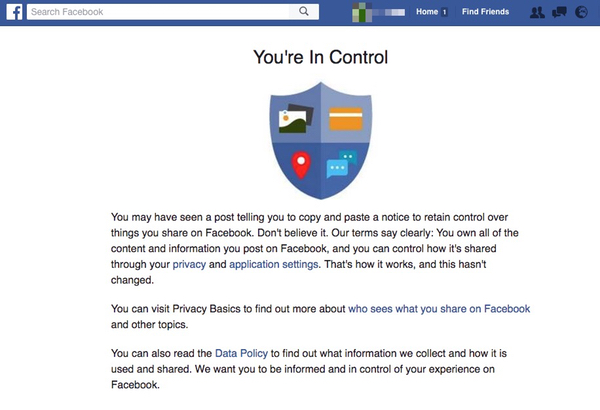Facebook users are at it again.
A post telling users to copy and paste a message if they wish to retain control over things they share on Facebook, is being copied left, right and centre.
Which is all very well and fine, of course. Apart from the fact that the message is utterly worthless. If you have shared the message, you are the victim of a facebook privacy notice hoax.
A typical message reads as follows (although there are minor variations in circulation):
For the record:
I do not give Facebook or any entities associated with Facebook permission to use my pictures, information, or posts, both past and future.
By this statement, I give notice to Facebook it is strictly forbidden to disclose, copy, distribute, or take any other action against me based on this profile and/or its contents.
The content of this profile is private and confidential information.
The violation of privacy can be punished by law (UCC 1-308- 1 1 308-103 and the Rome Statute).
NOTE: Facebook is now a public entity. All members must post a note like this. If you prefer, you can copy and paste this version. If you do not publish a statement at least once it will be tactically allowing the use of your photos, as well as the information contained in the profile status updates.
These phoney messages are not a new thing, and have been circulating for years.
The bogus message has become so widespread that Facebook has created a page debunking it.

You may have seen a post telling you to copy and paste a notice to retain control over things you share on Facebook. Don't believe it. Our terms say clearly: You own all of the content and information you post on Facebook, and you can control how it's shared through your privacy and application settings. That's how it works, and this hasn't changed.
Last year comedian John Oliver was clearly so fed up with the regular appearance of these bogus messages that he mocked them on his TV show:
https://www.youtube.com/watch?v=Fmy6M1oHrAo&rel=0
Although some may believe that they are harmless, chain letters and hoaxes waste time and can often spread misleading or even downright dangerous advice to unwary computer users.
The problem is, of course, that it's just so darn easy to copy-and-paste someone else's message, to hit the Like button, or simply reshare a message with every one of your friends and connections on the world's biggest social network.
Facebook users who can't be bothered to check the facts simply replicate the message in the mistaken belief that it will afford them some benefit, and the more other Facebook users see their friends posting the message the more they will think that perhaps they should do the same.
And that's why hoaxes like this never seem to die.
If you really care about who can see and share what you post on Facebook, then you would be served much better by checking your privacy settings... or indeed, not posting the content in the first place.




